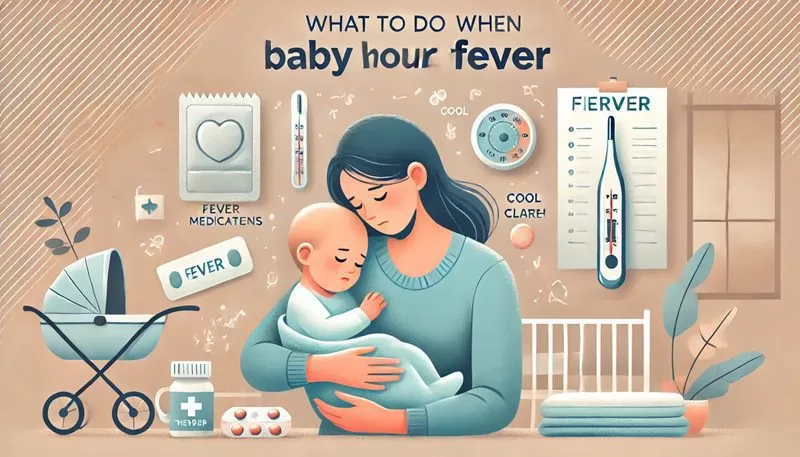Table of Contents
Baby Fever Care Tips
When your baby has a fever, it can be a worrying experience, especially for first-time parents. Understanding how to respond to your baby’s fever is crucial in keeping them comfortable and safe. In this guide, we’ll go over the essential steps to take when your baby has a fever, including how to manage it at home, when to seek medical help, and how to keep your baby comfortable. We’ll also highlight some of the best products from [your store] that can help you handle these situations effectively.
It’s important to stay calm when your baby has a fever and monitor their symptoms closely. If you’re looking for expert advice on managing a fever in infants, learn more about fever management from trusted pediatricians. Fever can often be a sign of an underlying issue, and it’s crucial to understand when to seek medical attention for your little one. Always keep in mind that fever is the body’s natural defense mechanism, but you must be aware of the key symptoms that may need prompt action.
Understanding Fever in Baby: Causes, Symptoms, and Remedy
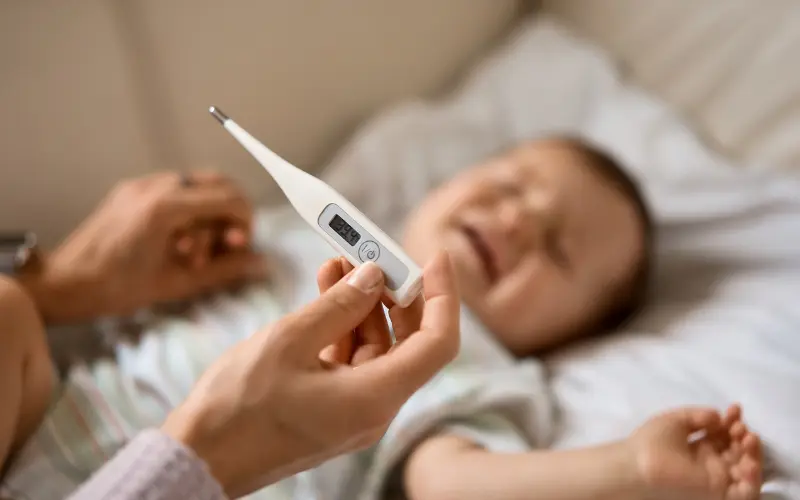
A fever is usually a sign that your baby’s body is fighting off an infection. It’s their immune system’s natural response to viruses, bacteria, or other pathogens. While a fever can be alarming, it’s not always a cause for immediate concern. Here are some common causes of fever in babies:
- Viral infections: Most fevers in babies are caused by viruses such as the flu, colds, or respiratory infections.
- Bacterial infections: While less common, bacterial infections like ear infections or urinary tract infections can also lead to fever.
- Teething: Mild fevers can sometimes occur during teething, though it’s usually low-grade.
Recognizing the symptoms of a fever is the first step in managing it. Some key symptoms include:
- A warm or flushed forehead
- Irritability or fussiness
- Poor feeding
- Restlessness or trouble sleeping
To accurately monitor your baby’s temperature, it’s important to have the right tools at home. Our Digital Baby Thermometer offers fast, reliable readings, making it easy to keep track of your baby’s temperature during these times.
Caring for a baby with a fever can be stressful and exhausting, often leading to sleep deprivation for parents. It’s essential to recognize the signs of sleep deprivation and take proactive steps to manage your rest during this challenging time. To help you navigate this situation, check out our article on How to Deal With Sleep Deprivation After Baby. It offers practical tips and strategies to ensure you can rest while caring for your little one, allowing you to be at your best when they need you the most.
Fever: Home Treatment and When to See a Doctor
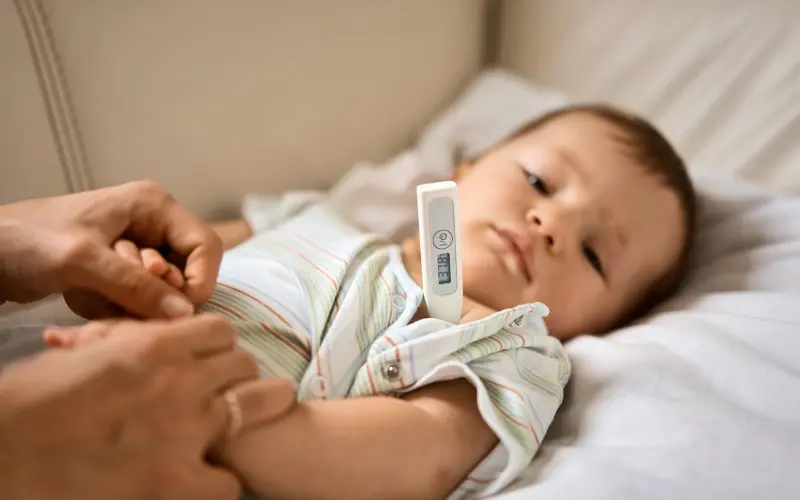
Managing a fever at home can be straightforward with the right knowledge and tools. However, knowing when to seek medical attention is also critical. Generally, you can manage a mild fever at home with proper care and monitoring, but you should call a doctor if your baby’s fever is accompanied by:
- Difficulty breathing
- Seizures
- Persistent vomiting or diarrhea
- Unresponsiveness or unusual lethargy
For infants under three months, any fever should be discussed with a pediatrician.
At home, there are several steps you can take to make your baby more comfortable. Our Baby Fever Cooling Pads can help soothe your baby by providing gentle cooling relief, especially during high fevers. Additionally, make sure your baby stays hydrated by offering breast milk, formula, or water (if they are older than six months).
When your baby is unwell, such as during a fever, it’s essential to keep an eye on their overall comfort, which includes managing diaper blowouts and leaks. Ensuring your baby is in a clean, dry diaper can help prevent additional discomfort and irritation, especially when they’re not feeling their best. For tips on handling these common issues effectively, check out our article on Managing Diaper Blowouts and Leaks.
How to Safely Bring Down a Fever in a Baby
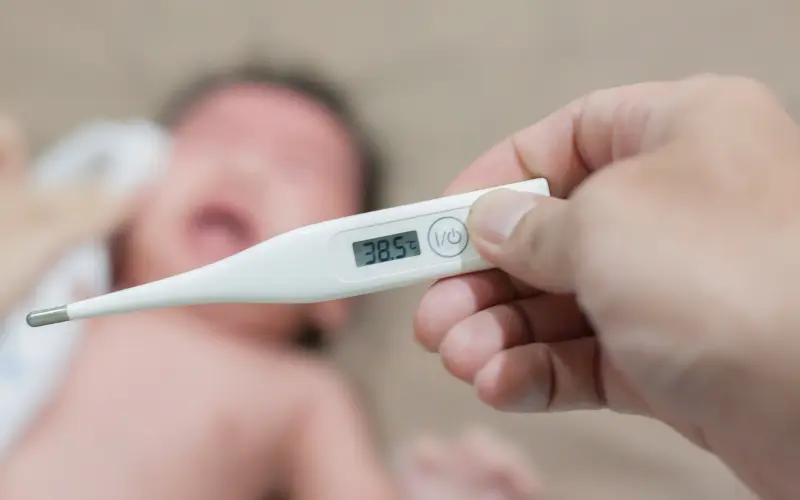
Knowing how to safely bring down a fever in a baby is crucial to keeping them comfortable while avoiding unnecessary risks. Avoid using cold water or alcohol-based wipes, as these can cause discomfort or even chills. Instead, use lukewarm baths or cooling products specifically designed for babies.
To help reduce fever naturally:
- Use lightweight clothing: Dress your baby in lightweight, breathable clothing to prevent overheating.
- Offer plenty of fluids: Keeping your baby hydrated is essential during a fever. Dehydration can worsen their condition.
- Monitor their temperature regularly: Our Digital Baby Thermometer allows you to keep a close eye on their temperature with accurate and quick readings.
For fevers that don’t come down with home remedies, or if your baby seems particularly uncomfortable, it’s best to consult your doctor about fever-reducing medications like infant acetaminophen.
If your baby has a fever, it’s essential to monitor for other symptoms that may indicate a more serious condition, such as jaundice. Jaundice in newborns can manifest as a yellowing of the skin and eyes and may require medical attention. Understanding the symptoms, causes, and treatment options for jaundice can help you respond appropriately. For more information on this condition, check out our detailed article on Jaundice in Newborns – Symptoms, Causes, and Treatment.
Comfort Measures During a Fever
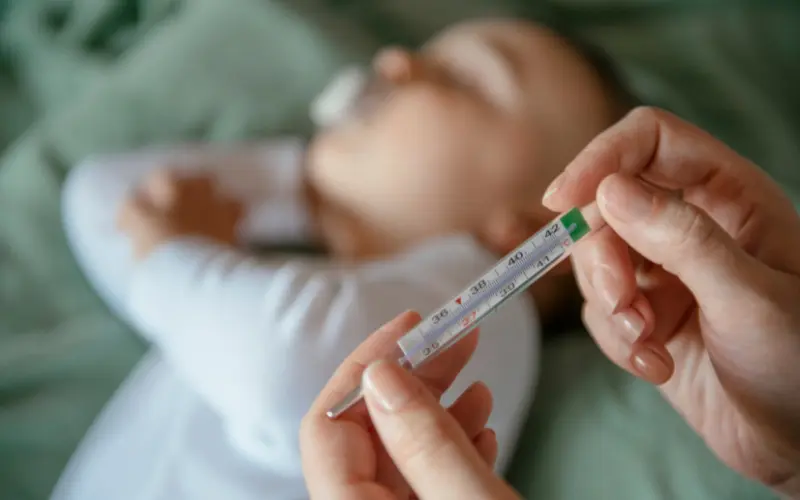
In addition to fever: home treatment and when to see a doctor, taking steps to keep your baby comfortable is key. Your baby may be more fussy and clingy when they have a fever, so make sure to provide plenty of cuddles and comfort. A soft, soothing environment can help. You may also consider using a humidifier in their room to help with breathing, especially if a fever is accompanied by congestion or a cough. Our Portable Baby Humidifier is perfect for creating a calm, relaxing space for your little one.
Other comfort measures include:
- Ensuring they get plenty of rest: Encourage your baby to rest as much as possible. Sleep is an important part of their recovery.
- Using a gentle fever cooling pad: Our Baby Fever Cooling Pads provide instant relief and can help your baby sleep better through the night.
Recognizing When the Fever May Be Serious
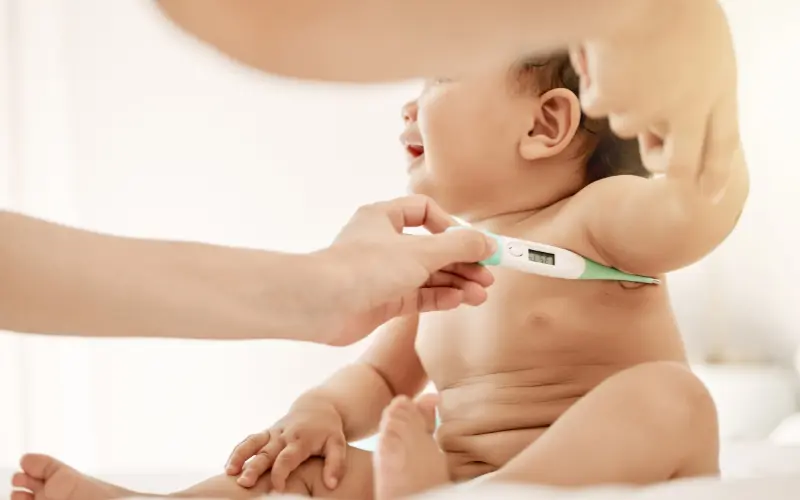
While most fevers are manageable at home, it’s important to know when to seek medical help. If your baby is under three months old and develops a fever, it’s best to contact your healthcare provider right away. For older babies, a fever lasting more than three days, or accompanied by other concerning symptoms like rash, persistent crying, or refusal to eat, warrants a doctor’s visit.
Some parents may also wonder if they should take their baby to the emergency room for a high fever. As a general rule, if the fever is above 104°F (40°C) or your baby is showing signs of serious illness such as lethargy, difficulty waking up, or persistent vomiting, seek medical attention immediately.
Fever in Baby – Causes, Symptoms, and Remedy Recap
Understanding fever in baby – causes, symptoms, and remedy is critical to managing your baby’s health. Fevers are typically the body’s natural response to infections, but knowing when to seek help and how to manage symptoms at home is key to ensuring your baby’s well-being. From viral infections to teething, a wide range of factors can trigger fevers in babies, but with the right tools and knowledge, you can help your little one recover comfortably.
When caring for a baby with a fever, it’s essential to consider upcoming travel plans. Managing a fever can be challenging on the go, so preparation is key. Knowing How to travel with a baby, and the gear you need and understanding the essential gear you need can help ensure a smoother experience. Whether you’re planning a short road trip or a longer journey, packing the right items—such as a travel-friendly thermometer, medication, and comfort items—can provide peace of mind. For more tips on navigating travel with your little one, check out our detailed guide on the gear you’ll need for a hassle-free trip.
Fever: Home Treatment and When to See a Doctor Recap
To wrap up, most fevers can be treated at home with simple remedies like fluids, rest, and light clothing. However, knowing when to call a doctor is essential. By using products like our Digital Baby Thermometer, Baby Fever Cooling Pads, and Portable Baby Humidifier, you can ensure your baby stays comfortable and that you can monitor their fever closely.
If the fever persists or your baby shows other worrisome symptoms, it’s time to contact your healthcare provider. Always trust your instincts as a parent—if something feels off, don’t hesitate to seek medical advice.

